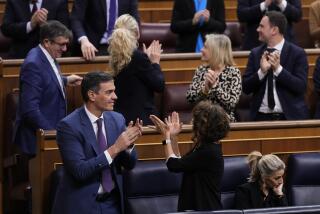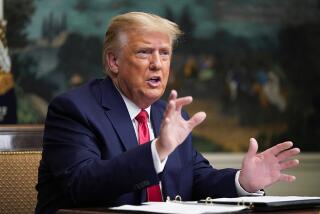Rebels Have Contacted Officials, Maliki Says
BAGHDAD — The Iraqi government has had contact with several insurgent organizations through intermediaries since the announcement of a partial amnesty plan, Prime Minister Nouri Maliki said Tuesday.
Under Maliki’s proposal, amnesty would be offered to insurgents who have not killed anyone, in return for their disarming and submitting to Iraqi law.
“Many people contacted me on the day I announced the reconciliation plan, and there is a lot of support even from militias and ... armed [insurgent] groups,” Maliki said during a rare interview with six Western and Iraqi journalists. “We welcome their assistance, but we are still waiting until we can meet directly with these groups and talk to them in a civilized way in order to bring them into the political process. These groups contacted us indirectly through mediators.”
Maliki declined to identify the groups.
The ambitious reconciliation plan announced Sunday comes on the heels of security clampdowns in Baghdad and Basra. Maliki is also developing economic and reconstruction proposals meant to present his government as strong and decisive, focused on national rather than sectarian concerns.
Although many have criticized the amnesty plan as not ambitious enough, vague or too conciliatory toward insurgents, Iraq’s disparate political groups appear to be giving Maliki a great deal of political leeway on the basis of his reputation as a pragmatic and objective leader.
“Since his first days in office, he’s shown a great understanding and support of the national project,” said Ammar Wajih of the Iraqi Islamic Party, the main Sunni Arab parliamentary coalition.
“He is the first elected Iraqi prime minister who addressed the issue of reconciliation matched with a security plan,” the lawmaker said. “The reconciliation is an official recognition of the existence of the resistance ... as distinguished from the terrorist groups.”
Abbas Bayati, a Shiite lawmaker, said Maliki’s efforts showed that he was willing to take a tack different from that of his predecessors.
“Maliki ... wants to send a message to the neighboring countries and the U.S. that he will not only use force to handle the security” issue.
Maliki also “would like to give space for policy and dialogue with the resistance,” Bayati said. “He would like to use the policy of stick and carrot.”
U.S. Ambassador Zalmay Khalilzad, at a news conference Sunday, said there had been “a lot more dynamism and activity” by Maliki than his predecessor, fellow Islamic Dawa Party member Ibrahim Jafari.
“Quite a lot has already been done in terms of considering issues and deciding on them,” Khalilzad said.
Despite Maliki’s nonsectarian reputation among Iraq’s political elite, he has been constrained by members of his Shiite bloc who are wary of any plan that might appear to appease the Sunni-led insurgents.
Maliki insisted that “amnesty doesn’t include those who have killed Iraqis or even coalition forces, because those soldiers came to Iraq under international agreements to help Iraq.”
“The fighter who did not kill anyone will be included in the amnesty,” he said. “But the fighter who killed someone will not be included.”
It was not immediately clear how the program would go about categorizing each fighter.
Maliki said that extending amnesty to violent insurgents was impossible.
“There are demands for general amnesty, but in my opinion this is wrong,” he said. “We have people we have detained who have confessed to killing 10, 20, 50, 100 Iraqis and Americans.
“It would result in a very bad reaction among Iraqis whose family members have been killed by those people, or even Americans with families who have been killed by those people.”
Shiites are not alone in opposing a general amnesty. A bipartisan group of U.S. lawmakers strongly condemned any move that would pardon insurgents who had attacked American soldiers.
Asked to specify who would be eligible for amnesty, Maliki said it would apply to those who had not committed violent acts.
“We divide crimes into two parts,” he said. “One is related to blood and killing and the other is related to opposing the government and sabotaging government institutions.”
Also eligible would be “those involved with illegitimate parties, like the Baathists, who want to come back into the political process but not under their old ideology.”
The reconciliation plan concerns Mahmoud Othman, a prominent Kurdish lawmaker, who said that a peace process that excludes the violent insurgents will fail.
“Insurgents in general have spilled blood,” Othman said. “If you just reconcile with people who haven’t caused any violence, then the violence will continue.”
Othman said that Maliki probably would prefer to offer more concessions to insurgent groups but that he must be careful not to appear to be soft on terrorism.
“He’s not free to do what he wants, so when he talks publicly he talks that way to avoid pressure here and there, but in his mind he wants to go further,” Othman said. “I know him -- he’s realistic and he wants to be serious.”
Othman said Maliki’s recent contact with insurgents proved his willingness to go further than his comments might indicate. The lawmaker said the rebel groups had been put in contact with Maliki by Sunni tribal figures, American officials and even President Jalal Talabani, who has been holding his own talks with insurgent sympathizers.
“Some of these moderators are living in Amman [Jordan], some in Anbar, some in Syria,” Othman said. “They have contacts with the other side and with us.”
During the interview, Maliki appeared relaxed and eager to answer journalists’ questions. The session took place in a conference room at his presidential complex as assistants served fruit juice and tea. A framed verse of the Koran in florid script read, “Take counsel with others and when you have reached a decision together, put your faith in Allah.”
Maliki, a member of the Shiite opposition during the reign of Saddam Hussein, led Dawa Party guerrilla operations while in exile in Syria and Lebanon. Upon his return to Iraq in 2003, he served on the De-Baathification Committee formed to purge members of the former regime and sat on the national constitution-drafting committee.
Since he was chosen prime minister in April, Maliki’s precarious position between so many competing agendas has engendered sympathy even from prominent Sunni leaders such as Ahmed Abdel Ghafour Samaraie, head of the Sunni Waqf endowment, the government agency that maintains Sunni houses of worship. The influential group endorsed Maliki’s plan Tuesday.
Hassan Sunayed, a Dawa Party member and acquaintance of Maliki’s for 25 years, said the prime minister’s deliberate style was necessary in Iraq’s fractious political environment.
“He is wise and open and never rushes things,” Sunayed said. “He is strict and forceful when it comes to the law.... I lived with him a long time and lived under the same roof with his family. He consults about everything -- even his tie!”
Samaraie acknowledged Sunni discontent with some aspects of Maliki’s proposal and his cautious pace but said he trusted his intentions and understood his limitations.
“He’s the proper man for this period and we hope he can succeed,” Samaraie said. “Actually, whatever his successes, it is not just his gain, it is for all of Iraq. This is why we are now supporting him.”
*
Times staff writers Borzou Daragahi and Saif Hameed contributed to this report.
More to Read
Sign up for Essential California
The most important California stories and recommendations in your inbox every morning.
You may occasionally receive promotional content from the Los Angeles Times.










